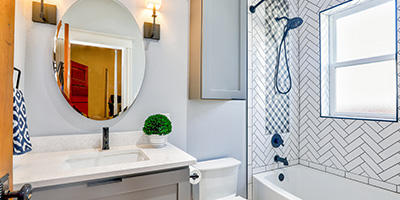New Homeowner's Guide to Bathroom Plumbing: Essential Tips
New Homeowner's Guide to Bathroom Plumbing: Essential Tips
Blog Article
Presented here further down you can get additional reliable answers all about General Plumbing Tips for New Homeowners.

For new house owners, understanding and keeping shower room pipes can conserve both money and time by avoiding expensive issues down the line. Below are some vital shower room pipes suggestions to assist you keep everything running smoothly.
Prepare for Winter
Shield your pipelines from cold during winter by insulating pipelines in unheated areas like basements, attics, and garages. During severe cold, allow cold water drip from taps served by revealed pipes to assist avoid cold.
Schedule Routine Upkeep
Think about organizing annual inspections with an accredited plumber. They can find problems that you could miss out on, such as hidden leakages or deterioration on pipes and fixtures. Routine maintenance aids extend the life of your pipes system and can protect against emergency situations.
Familiarize Yourself with the Main Shut-Off Shutoff
Recognizing where the major water shut-off valve lies in your house is crucial. This enables you to swiftly switch off the water supply in case of major leaks or during plumbing emergencies, stopping substantial water damages.
Regularly Inspect for Leaks
Tiny leakages can result in big problems. Frequently check under sinks, around toilets, and near pipes fixtures for any type of signs of leaks. Search for dampness, tiny drips, or corrosion. Catching and repairing leaks early can stop much more significant damages and save water.
Preserve Your Hot Water Heater
Guarantee your water heater is set to an ideal temperature level (normally around 120 levels Fahrenheit) to stop hot and decrease energy use. Flush the tank yearly to remove sediment buildup, which can decrease the effectiveness and life expectancy of your heating unit.
Update Your Components
If your home has older fixtures, think about updating to extra efficient designs. Modern commodes, showerheads, and taps are designed to use less water while supplying good stress, which can significantly reduce your water costs and ecological footprint.
Be Cautious with DIY Pipes Services
While it's appealing to deal with all home repair services on your own, be cautious with plumbing. Some concerns might require expert knowledge, specifically if they include major water lines or sewage system repairs. Employing an expert can occasionally be much more cost-efficient than DIY, especially if it avoids additional damages.
Do Not Neglect Slow Drains
If your sink or bath tub is draining slowly, it's frequently an indication of a blockage creating. Resolving this early can prevent a full obstruction. Make use of a bettor or a plumbing professional's snake to clean out particles. Avoid utilizing chemical drain cleansers as they can harm your pipelines with time.
Know What Not to Flush
Toilets are not waste disposal unit. Avoid purging anything other than toilet paper and human waste. Things like wipes, womanly hygiene products, and cotton swabs need to be gotten rid of in the garbage to avoid blockages and sewage system back-ups.
Install Strainers in Drains
Area strainers in your sink and bath tub drains to catch hair and various other particles before they enter your pipes system. Cleansing the strainers regularly will help stop build-up and maintain water moving easily.
Final thought
Comprehending and maintaining your home's washroom plumbing can stop several common problems. By complying with these essential pointers, you can guarantee your restroom stays practical and effective, saving you time and money in the future.
Essential Plumbing Tips for Homeowners: Keep Your Pipes Flowing Smoothly
As a homeowner, understanding the basics of your plumbing system can save you time, money, and a lot of headaches. Plumbing issues can range from minor annoyances like dripping faucets to major problems like burst pipes that cause significant damage. This guide provides essential tips to help you maintain your plumbing system and tackle common issues.
Understanding Your Plumbing System
Supply System: Brings fresh water into your home from a municipal source or a well. Drain-Waste-Vent System: Removes wastewater and vents sewer gases outside. Fixtures and Appliances: Includes sinks, toilets, showers, dishwashers, and washing machines. Basic Maintenance Tips
Regular Inspections: Periodically check for leaks, corrosion, and other signs of wear and tear. Look under sinks, around toilets, and near water heaters. Know Your Main Shut-Off Valve: In case of a major leak, you’ll need to shut off the water quickly. Ensure everyone in your household knows where the main shut-off valve is located. Prevent Frozen Pipes: In cold climates, insulate exposed pipes and let faucets drip during extreme cold to prevent freezing. Use Strainers: Install strainers in sinks and tubs to catch hair, food particles, and other debris that can cause clogs. Common Plumbing Issues and Solutions
Clogged Drains:
Prevention: Avoid pouring grease down the drain and use drain screens to catch debris. DIY Fix: Use a plunger or a plumbing snake to clear minor clogs. For stubborn clogs, a mixture of baking soda and vinegar can sometimes help. Leaky Faucets:
Prevention: Replace washers and seals regularly. DIY Fix: Turn off the water supply, disassemble the faucet, and replace worn parts.

Visit Homepage Report this page